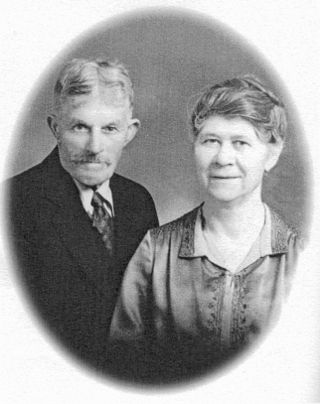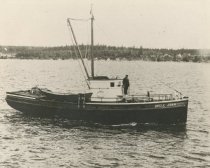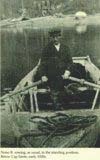PETER BABAROVICH BORN 1861 & DIED IN ANACORTES 1935
My maternal grandfather Peter (Petar) Babarovich died the year I was born – 1935. I was born on February 21st, 1935, and he died a month later on March 5th of that year. As a result, I never knew this unique man. Nonno Babarovich was born on April 12, 1861, in the village of Splitska on the island of Brac in Croatia off the coast of Split, Yugoslavia in the Adriatic Sea. Peter was the second child of his father, Ernest Babarovich, and his wife Louise Setelich. The family exported wine and olive oil which they grew in their vineyards and olive orchards.  Peter married my grandmother, Marija Mattia Vulic, who lived on the island, in 1888. She was born September 21, 1863, and died August 8, 195,3 in Anacortes, Washington They had seven children, all of whom, except my mother Mary, were born in Splitska. Their children were: Mary Thelma, Anna Louise, Clara Jacqueline, Thelma Mary, Ernest Dominic, Nick, and Catherine. Mother was born in Anacortes on September 21, 1905, and died there on December 7, 2000. For her history see: (http://paulluverajournalonline.com/weblog/2008/07/mary-thelma-babarovich-my-mother.html)
Peter married my grandmother, Marija Mattia Vulic, who lived on the island, in 1888. She was born September 21, 1863, and died August 8, 195,3 in Anacortes, Washington They had seven children, all of whom, except my mother Mary, were born in Splitska. Their children were: Mary Thelma, Anna Louise, Clara Jacqueline, Thelma Mary, Ernest Dominic, Nick, and Catherine. Mother was born in Anacortes on September 21, 1905, and died there on December 7, 2000. For her history see: (http://paulluverajournalonline.com/weblog/2008/07/mary-thelma-babarovich-my-mother.html)
What I know about my grandfather comes mostly from the information my mother related and historical information my oldest sister Phyllis collected and wrote about. My grandmother did not speak English. But, our cousin George E. Prelenda, had spent a summer with my grandparents and spoke the Yugoslavian language fluently. He shared a lot of background information he knew about with Phyllis which she related in historical writings. George was a unique person himself. He was born in 1919 in South Dakota to my Aunt Anna Babarovich and her husband Nick Prelenda. George had graduated in Far Eastern Studies at the University of Washington and worked for the CIA where he specialized in Bulgarian translations. He was a language specialist.
The immigration of the Babarovich family from Brac to America was unique. Nonno’s brother John, the eldest son, had immigrated to the United States in 1879 after being financed by his father. John was only twenty-two years old when he left. However, for reasons that are unclear, he lost contact with the family after some time. They had no contact for ten years until a customer buying wine at their vineyards in Splitska told them he had had a business connection with John in America. He was able to provide the family with John’s location and the family wrote him. In 1901, John responded and sent money for his brothers as well as some of the older children to come to America where he was located. The brothers and a few older children left for America locating in the Anacortes area of Washington. In 1902 they sent for the remaining family which included my grandmother Marija, who, along with her five children, traveled with Peter’s brother, Spiro to America. In May of 1902, they left for America. John paid the cost for all of them. Their route was from Brac to France where they got on a ship. They landed in New York. In New York, they entered Canada to take a train across Canada to the West Coast arriving by train in Burlington, Washington. John picked them up at the Burlington train station with a wagon. He took them by horse and wagon to Anacortes. After spending the night they traveled by mail boat to Sinclair Island where the brothers had a homestead land. Peter and Marija’s seventh child, John, was born on Sinclair Island.
Burlington train station with a wagon. He took them by horse and wagon to Anacortes. After spending the night they traveled by mail boat to Sinclair Island where the brothers had a homestead land. Peter and Marija’s seventh child, John, was born on Sinclair Island.
My grandparents decided to relocate in Anacortes. To get there, Peter put the family and their belongings on a borrowed scow which he rigged with a homemade sail and rudder. Arriving in Anacortes. They located at 1108 6th Street. in Anacortes. Nonna Marija ran a boarding house and Peter was a commercial fisherman. Their youngest child Mary, my mother, was born in Anacortes in 1905.
My grandparents did not consider themselves to be Yugoslavian., they considered themselves Austrians. That’s because the area they were brought up in had been part of the Austro-Hungarian Empire which broke up in 1918 after the First World War. Yugoslavia—the land of South (i.e. Yugo) Slavs—was created at the end of World War I when Croat, Slovenian, and Bosnian territories that had been part of the Austro-Hungarian Empire united with the Serbian Kingdom. Peter had served ten years in the Austro-Hungarian navy before he married. As a result, he was loyal to the previous Emperor. He kept a framed portrait of Francis Joseph I and his queen in the parlor of the Babarovich home.
themselves Austrians. That’s because the area they were brought up in had been part of the Austro-Hungarian Empire which broke up in 1918 after the First World War. Yugoslavia—the land of South (i.e. Yugo) Slavs—was created at the end of World War I when Croat, Slovenian, and Bosnian territories that had been part of the Austro-Hungarian Empire united with the Serbian Kingdom. Peter had served ten years in the Austro-Hungarian navy before he married. As a result, he was loyal to the previous Emperor. He kept a framed portrait of Francis Joseph I and his queen in the parlor of the Babarovich home.
The kitchen in the house on 6th Street was huge. The house was rectangular and two stories high. The pallor located in the front entry of the house, was kept clean for visitors as a parlor. All of the family activity took place at the other end of the house where the large kitchen was located. I have clear memories of that house, the large kitchen with a table to sit around and the pots and pans with wonderful smells and plenty of food on hand to eat. Outside in the back were the chickens and along side the house a huge garden. The family was supplied by the garden and ocean. Peter and the boys also caught crabs which were sold and they fished commercially. In addition, they fished for family eating as well as having chickens and a garden to feed the family. Peter rowed a boat to place his crab pots and to get around. Peter had the habit of rowing his boat standing up with a forward roll of his wrists. He had powerful arms and shoulders.
Nonno Babarovich’s brother John never married and was a successful businessman in Anacortes. He owned a warehouse and in 1913 built a purse seine boat “Uncle John.” It was the first seine boat that could sleep ten crew on board. It may have been an unusual name for a fishing boat, but unique names of commercial fishing boats in Anacortes were not that unusual. For example, one year I crewed on a purse seine boat named the “Don’t Worry” because the bank had loaned the money to build it and the man who ran it, named it after what he had told the banker who agreed to loan the money
John died September 15, 1916, and is buried at the cemetery in Anacortes. On his tombstone, it says “Known Among Men as Honest John.” All of the brothers, including Peter, my grandfather, had the same honesty and character. Peter was a simple man whose word was his bond and who asked nothing of anyone except a chance to make an honest living in his new country. Their children, including my mother, were of the same mentality – good, hard-working, honest people who made this country so great as the great mixing pot of the world. It was a privilege to have been born into this family and have Peter as my grandfather. May he rest in peace.
